In this era, optimizing industrial processes is crucial for staying afloat in a competitive market. DCS enhance industrial automation stand out as pillars of smart manufacturing technologies. They redefine how automation software solutions elevate efficiency throughout the manufacturing sectors. DCS optimize plant actions from managing temperature to controlling pressure and regulating flow. This sophisticated interplay of DCS controllers, facilitated by essential communication protocols like Modbus and EtherCAT, offers instant, real-time data to operators. Such data permits swift adjustments, significantly boosting productivity.
Moreover, DCS play a vital role in automating processes, reducing errors, and streamlining maintenance practices. Their groundbreaking impact stems from coordinating operations and analyzing process performance data. This analysis is pivotal for smart manufacturing, paving the way for automation solutions designed for industrial optimization.
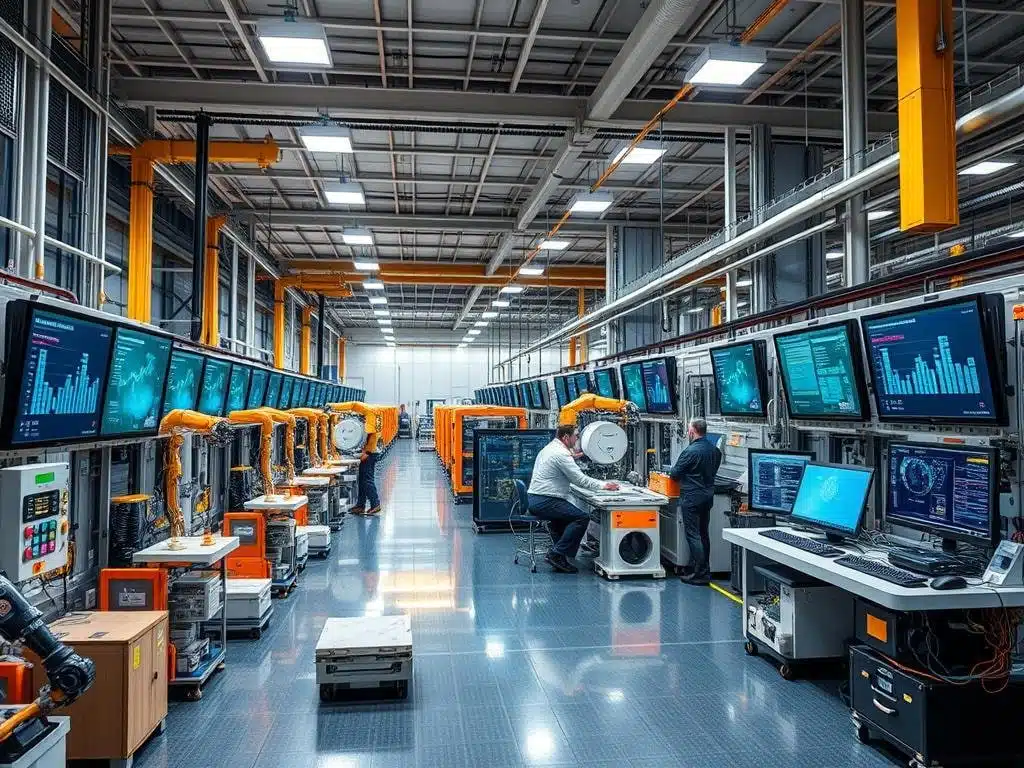
Key Takeaways
Understanding how DCS lead to a productivity boost by automating and optimizing plant operations.
Recognizing the role of DCS in offering real-time data for immediate system adjustments and troubleshooting.
Emphasizing the significance of DCS in facilitating smart manufacturing technologies.
Exploring the capabilities of DCS as a foundation for advanced automation software solutions.
Appreciating the contribution of DCS to improved safety, cost-saving measures, and enhanced flexibility in adapting to market changes.
Considering the expansive use of DCS across diverse industries such as pharmaceuticals, oil refineries, and chemical plants.
Examining the importance of various DCS components, from controllers to I/O modules and HMIs in contributing to industrial automation.
The Role of DCS in Advancing Operational Efficiency
In the quest for enhanced productivity and resilience, Distributed Control Systems (DCS) play a vital role. They have revolutionized manufacturing by integrating advanced industrial automation tools. These systems greatly improve operational efficiency by streamlining control processes. We will explore how DCS is instrumental in enhancing production through automation, efficient data handling, and quality improvements, ensuring optimal performance across various tasks.
Automation of Repetitive Tasks & Error Reduction
DCS systems excel in automating essential yet repetitive tasks within industrial control systems, effectively managing complex processes. Tasks range from adjusting flow rates to managing motor speeds. This automation cuts down manual efforts and markedly diminishes human error, boosting safety and reliability. With the tedious operations handled by DCS, industries can allocate human resources to strategic tasks, enhancing productivity and management.
Real-time Data Processing & System Adjustments
Real-time data processing stands out as a key feature of contemporary DCS. By assimilating data from various field devices, these systems immediately analyze and process information. This enables swift adjustments to systems, maintaining optimal production conditions. Such quick adaptation to changes or hazards ensures steady and efficient operations throughout the entire process.
The Impact on Product Quality & Downtime Minimization
DCS implementation boosts not just efficiency but also product quality and lessens operational downtime. Through strict control and data insights, DCS ensures consistent quality in final products. Its advanced fault detection and diagnostics quickly pinpoint problems. This leads to rapid solutions that reduce downtime and maintain continuous production.
| Feature | Impact on Industry |
|---|---|
| Automated Control | Reduces manual tasks and enhances process accuracy. |
| Real-time Data Processing | Enables immediate adjustments, maintaining system integrity. |
| Quality Assurance | Ensures consistent product quality, meeting industry standards. |
| Downtime Minimization | Quick issue resolution keeps production lines operational. |
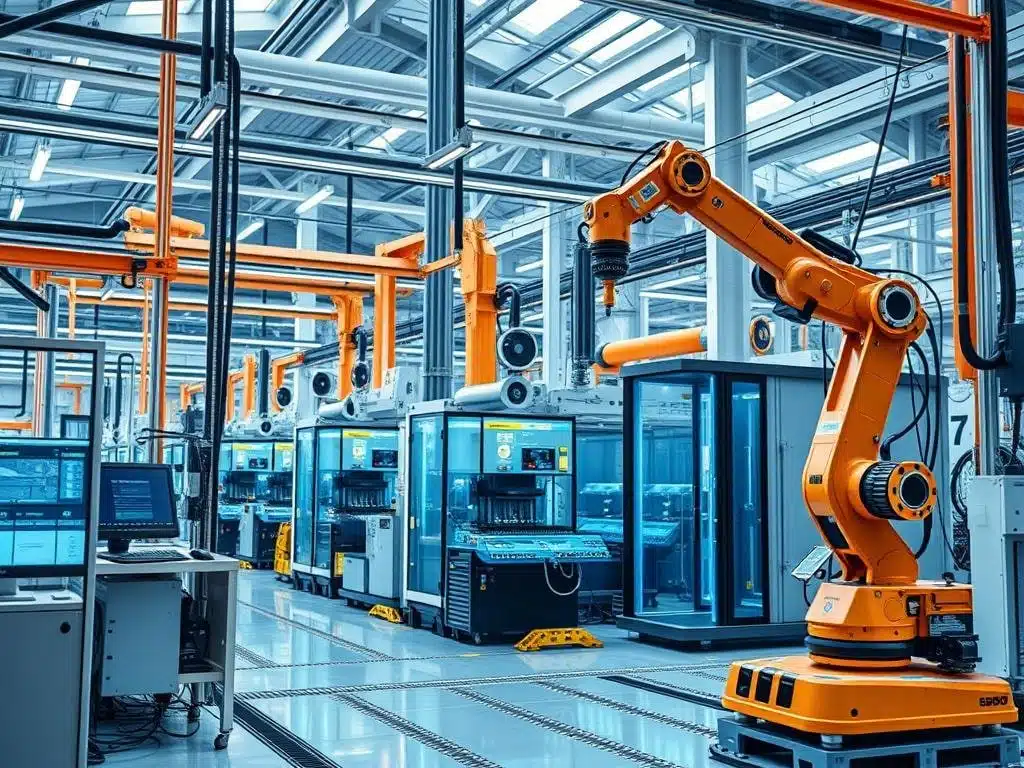
DCS Enhance Industrial Automation
In the swiftly changing industrial scene, Distributed Control Systems (DCS) are key in enhancing manufacturing processes. They integrate digital transformation solutions which streamline operations and manage the entire system seamlessly. This boosts productivity in various sectors.
DCS’s real-time control is a major advantage. It lets operations instantly monitor and adjust, ensuring efficiency. This is critical for precision-demanding industries. Additionally, DCS systems’ scalability allows adaptation for both small and large operations, challenging the belief that they suit only major enterprises.
These platforms are not only adaptable but come with easy-to-use interfaces. This eases the digital transition for many industries. Sectors such as automotive and power generation benefit from higher production and fewer errors. Thus, DCS’s role in industrial automation is significant.
Moreover, DCS is crucial in integrating digital transformation solutions, advancing businesses into Connected Enterprises. This boosts connectivity and streamlines production, optimizing energy use and cutting costs.
| Industry Application | Benefits of DCS |
|---|---|
| Chemical Manufacturing | Precision in managing chemical reactions, maintaining correct temperatures, pressures, and concentrations |
| Food & Beverage | Ensures consistent quality in mixing and blending processes |
| Pharmaceuticals | Enhances safety and efficiency in drug production |
| Power Generation | Optimized fuel use, increased production rates |
| Automotive Manufacturing | Minimization of errors and streamlined operations |
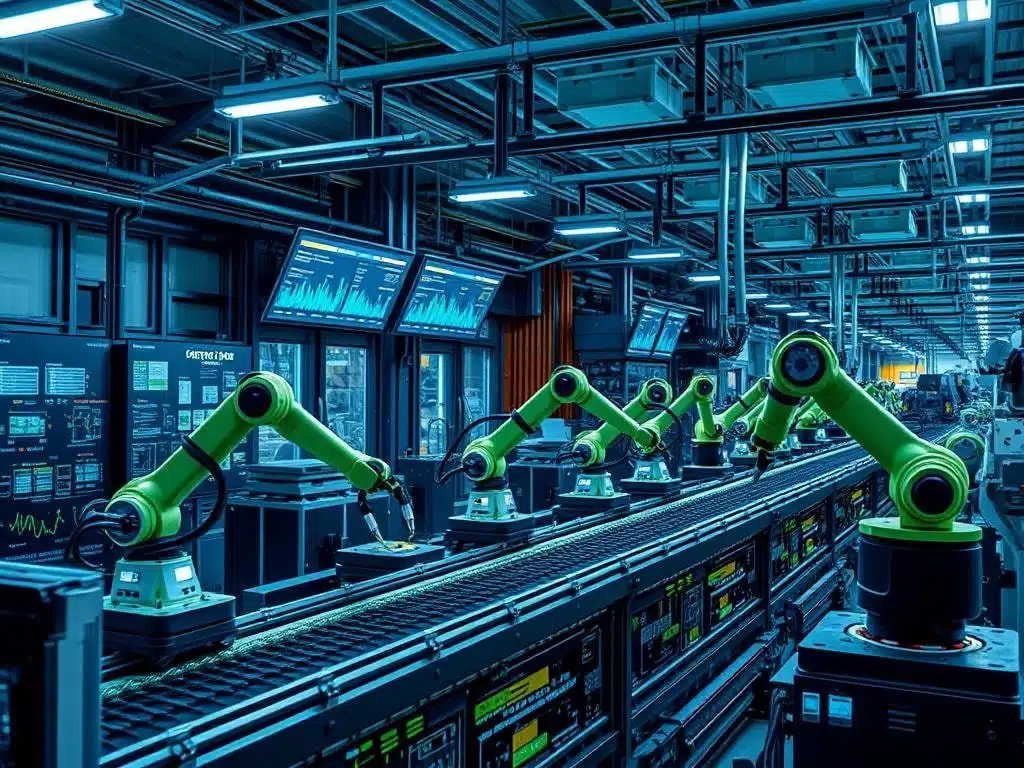
The sophistication of DCS systems boosts industrial automation by delivering thorough control and optimization of manufacturing processes. This not only reaches high productivity standards but also aids the progression towards Industry 4.0 principles. Utilizing DCS for digital transformation solutions prepares industries to overcome future challenges and secure long-term growth.
Maximizing Process Control with Distributed Architecture
Industries have long depended on centralized control systems for operations management. But, with progress in industrial process optimization, a significant pivot towards distributed control systems (DCS) occurred. This shift not just strengthens process control but also betters the durability of industrial automation software solutions. Exploring how moving to a distributed framework can outshine the centralized model and the perks it introduces to industrial settings is fascinating.
Distributed Versus Centralized Control Systems
The edge of Distributed Control Systems (DCS) and SCADA systems is in their modular structure, enhancing flexibility and growth potential. Centralized systems risk being overwhelmed, thus creating bottlenecks, but DCS divides the labor. This dispersion guarantees that no sole failure spot can halt the whole operation. This feature is vital in sectors where system dependability and continuous availability are critical.
Moreover, DCS systems offer superior data management and analysis. This is necessary for making instant decisions and long-term strategic plans, especially in areas that demand strict industrial process optimization.
The Resilience of DCS in Industrial Environments
DCS stands up impressively to the rigors of industrial settings, ensuring dependability when it matters most. With embedded redundancy and fail-safe features, these systems dramatically lower operational risks. The integration of human-machine interface (HMI) technology provides intuitive dashboards, real-time graphics, and alert systems, enhancing operational efficiency and informing decision-making in complex industrial environments. They guarantee batch uniformity in key manufacturing processes, like chemicals, and control operations meticulously—from regulating temperatures and pressures to maximizing overall system effectiveness. As a result, there’s a notable boost in product quality and operational reliability, vital for competitive industrial automation software solutions.

DCS’s resilience also supports predictive maintenance by using data analytics to identify and prevent possible failures before they happen. This forward-thinking strategy not only saves money but also minimizes downtime, increasing efficiency in sectors such as energy, oil, gas, and water treatment. The addition of safety blocks and emergency halt features further enhances the system’s capacity to effectively manage hazards in risky settings.
To conclude, the shift toward distributed control systems marks a substantial advancement in industrial process optimization. By enhancing safety, output, and data control, DCS enable companies to uphold superior production and quality levels, vital for success in the current competitive market.
Smart Manufacturing Through Digital Transformation Solutions
In today’s fast-paced industrial domain, the fusion of industrial IoT integration with automation software solutions is transformative. By employing sophisticated automation tools, industries boost their operational efficiency. This also heralds the arrival of innovative manufacturing methodologies.
Integrating IoT & AI for Advanced Automation
Combining IoT with AI is a groundbreaking move in industrial automation. This combination creates a network where devices communicate effortlessly, enabling swift, real-time decision-making. Advanced automation tools, powered by AI, improve product quality while minimizing downtime. Additionally, IoT devices with sensors yield vital data, allowing AI to predict and adapt, enhancing industrial IoT integration.
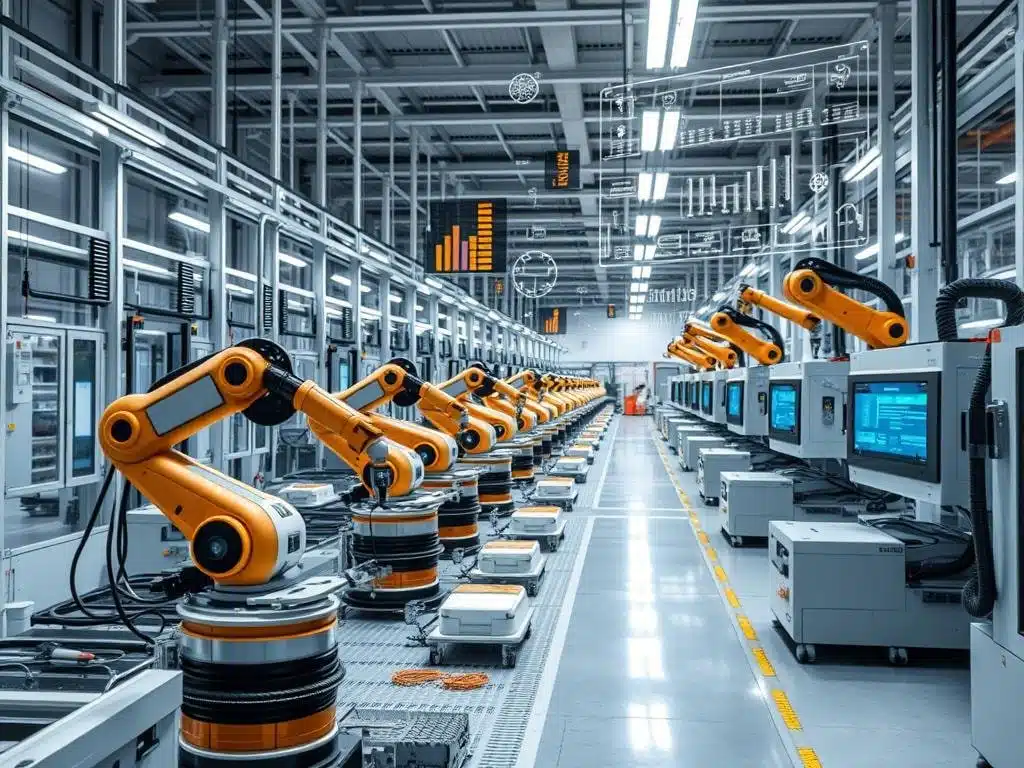
Embracing Predictive Maintenance with DCS Technologies
Predictive maintenance, driven by DCS (Distributed Control Systems), is crucial for modern manufacturing. DCS leads in anticipating problems before they cause significant downtime. These systems detect faults early through relentless monitoring and sophisticated diagnostics. As a result, they ensure equipment’s high availability and reliability. This foresighted maintenance strategy lengthens the lifespan of machinery and slashes operational costs linked to unexpected failures.
| Feature | Benefit |
|---|---|
| Real-Time Data Analysis | Enables predictive maintenance and faster decision-making. |
| Advanced Diagnostics | Improves system availability and reduces downtime. |
| Interoperability | Seamless integration with existing and future technologies. |
| Scalability | Fits various industrial sizes and complexities. |
Our deliberate focus on merging industrial IoT and AI with DCS powers digital transformation solutions. It aligns with current needs and preps for future manufacturing breakthroughs. Our commitment to these cutting-edge technologies shows our dedication to leading industry standards. We ensure our processes are as economically efficient as they are technologically sophisticated.
Enhancing Safety Measures with Industrial Control Systems
In today’s manufacturing landscape, the emphasis on industrial safety and international regulatory compliance is critical. This is particularly true for industrial control systems. With the advent of Distributed Control Systems (DCS), industries have seen a significant leap in safety enhancements. This advancement not only protects machinery but also upholds the safety of individuals.
DCS systems are key in automating the monitoring of hazardous situations, thereby preventing accidents. These advanced setups detect dangers and swiftly act to lessen risks. Their operation adds a vital protective layer. This adheres to strict international safety standards.
Real-Time Monitoring of Hazardous Conditions
The foundation of DCS systems rests on monitoring, detection, and response. Through sophisticated sensors and logical controls, they offer relentless surveillance. This process is quintessential for upholding safety and avoiding operational setbacks. The latter could result in substantial economic and reputation losses.
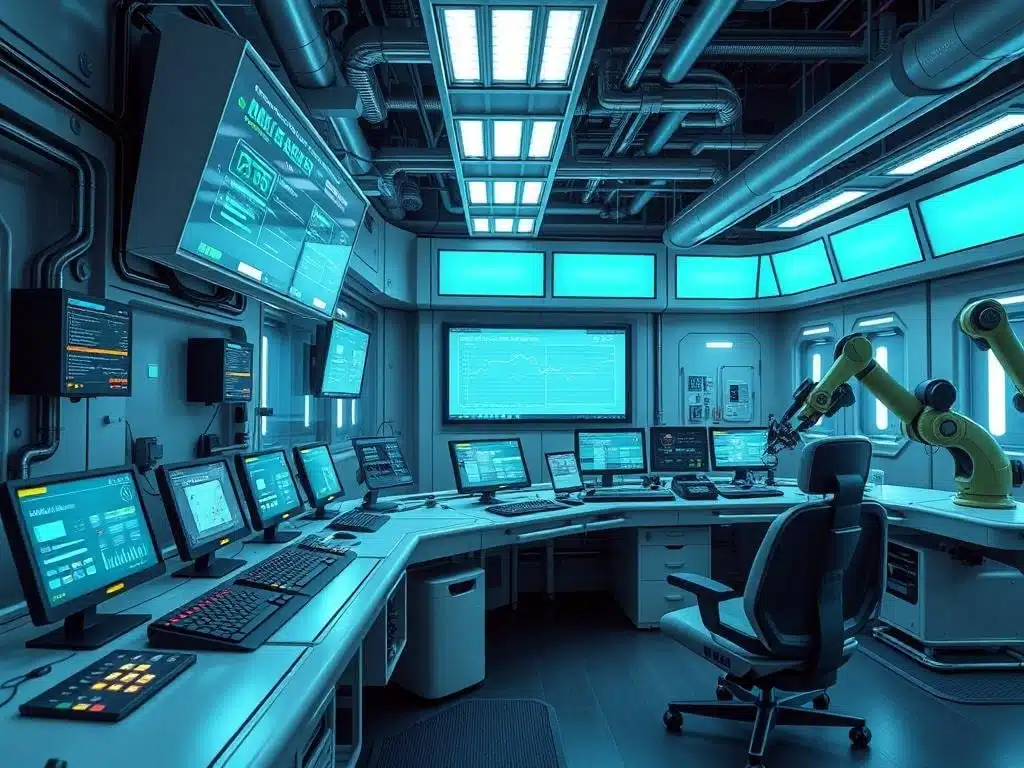
Compliance with International Safety Standards
DCS’s role extends to ensuring industrial control systems comply with international regulatory compliance. They align operations with everything from U.S. OSHA regulations to global ISO standards. Adherence is not just a legal requirement but a part of ethical manufacturing and corporate responsibility.
The incorporation of advanced DCS also tackles cybersecurity and unauthorized access dangers. These threats are mounting in today’s interconnected world. DCS are instrumental in protecting data and ensuring operational integrity, guarding against digital and physical breaches.
Discover more about how automation and DCS boost functionality, efficiency, and safety in the industrial realm by visiting this thorough resource here.
Cost-Effectiveness of Implementing DCS
Implementing Distributed Control Systems (DCS) significantly cuts costs in large industrial settings. They reduce energy consumption, material waste, and labor costs through automation software solutions. These systems also maintain stringent quality standards and adjust operations to meet changing demands efficiently.
Automation software solutions embedded within DCS quickly respond to changing environmental conditions. This showcases the growing industrial preference for these advanced industrial automation tools.
Comparative statistics highlight the economic advantages of DCS. For instance, businesses that adopt open process automation systems report a 47% cost saving over 25 years, compared to traditional setups. Despite higher initial costs, these investments are likely to decrease as standardized solutions become more widespread.
Industries like petrochemicals or pharmaceuticals benefit greatly from DCS due to the need for scalability and flexibility. These systems efficiently manage numerous control loops and ensure continuous operation with built-in redundancies, critical for productivity in complex scenarios.
The US Industrial Control and Factory Automation market, with a significant push from DCS, is set to double by 2032. This growth highlights DCS’s essential role in modern industrial activities.
Adopting DCS optimizes efficiency and prepares for future technological advances like IIoT and 5G. This casts DCS as foundational in creating more connected, resilient, and efficient industries.

DCS & the Incorporation of Industrial IoT Integration (IIoT)
The integration of Distributed Control Systems (DCS) with industrial IoT marks a significant evolution in industrial automation. DCS, coupled with IoT devices, enables groundbreaking connectivity. It supports data-driven decisions, enhancing process management and automation capabilities.
By leveraging IoT, DCS systems collect crucial real-time data on aspects like temperature and pressure. This data is vital for optimizing operations. It boosts productivity in manufacturing and energy sectors. Furthermore, this amalgamation fast-tracks the transition to Smart Manufacturing. Insights gained enable predictive maintenance and improve quality control. For more insights, examine the transformative benefits detailed in this North America industrial process article.
Connectivity & Data Exchange with IoT Devices
The integration with industrial IoT facilitates seamless data exchange between IoT devices and DCS. This connectivity ensures a continuous stream of real-time information. It allows operations to swiftly react to new data, refining processes and minimizing downtime.
The Advantages of a Data-Driven Industrial Environment
Incorporating IoT with DCS fosters an environment where decisions are based on precise, current data. This scenario enhances operational efficiency, conserves energy, and elevates quality standards. The benefits of such an environment are substantial. Integrating these technologies offers significant competitive edges, as highlighted in the advantages of a data-driven industrial environment.
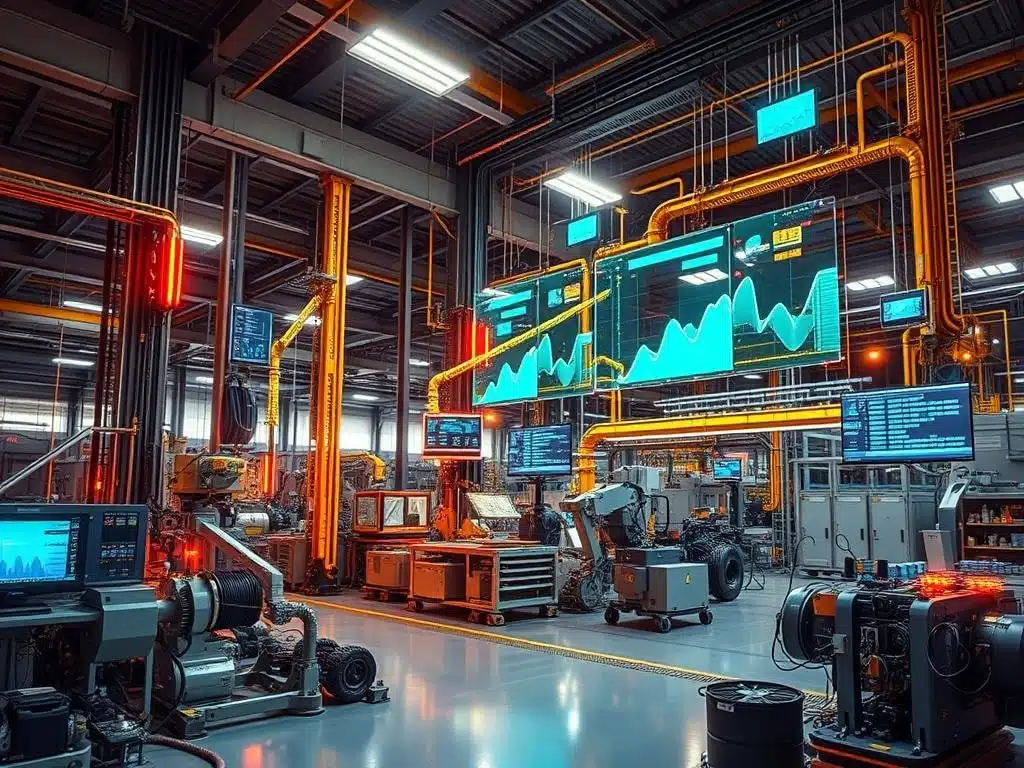
| Feature | Benefits |
|---|---|
| Real-time data acquisition | Enhanced process monitoring and control |
| Predictive maintenance | Reduced maintenance costs and downtime |
| Energy efficiency | Optimized energy usage and cost savings |
| Secure implementation | Robust cybersecurity protocols ensuring data integrity |
| Scalable architecture | Flexibility to expand and integrate with growing industrial needs |
Utilizing Advanced Industrial Automation Tools for Flexibility
The landscape of industrial automation is evolving due to the integration of advanced automation. It is increasingly focused on flexibility in manufacturing. This evolution is key to quickly adjusting production processes to meet changing market desires and consumer tastes.
Embracing scalable industrial solutions aids in faster changeovers. It also ensures manufacturers can update their production lines with minimal downtime or extra costs.
Adapting to Market Demands with Quick Changeover Capabilities
The embrace of robotics and computer-assisted controls has boosted manufacturing flexibility. Companies can now swiftly alternate between product lines. They adapt to market fluctuations with speed, reducing the adjustment time. This maximizes the productive use of manufacturing assets.
Scalability & Modular Design Facilitating Product Customization
Automation systems that utilize modular design principles lead to scalable industrial solutions. Such an approach aids in tailoring products to customer needs. It also permits manufacturers to increase production capacity as required, without completely overhauling current setups.
Future Trends in Industrial Automation
| Year | Trend | Impact |
|---|---|---|
| 2025 | AI and Machine Learning Integration | Revolutionize decision-making and manufacturing precision. |
| 2025 | IoT and Connectivity Advancements | Enhance data-driven manufacturing and system interoperability. |
| 2025 | Collaborative Robotics Growth | Improve human-robot collaboration elevating productivity and safety. |
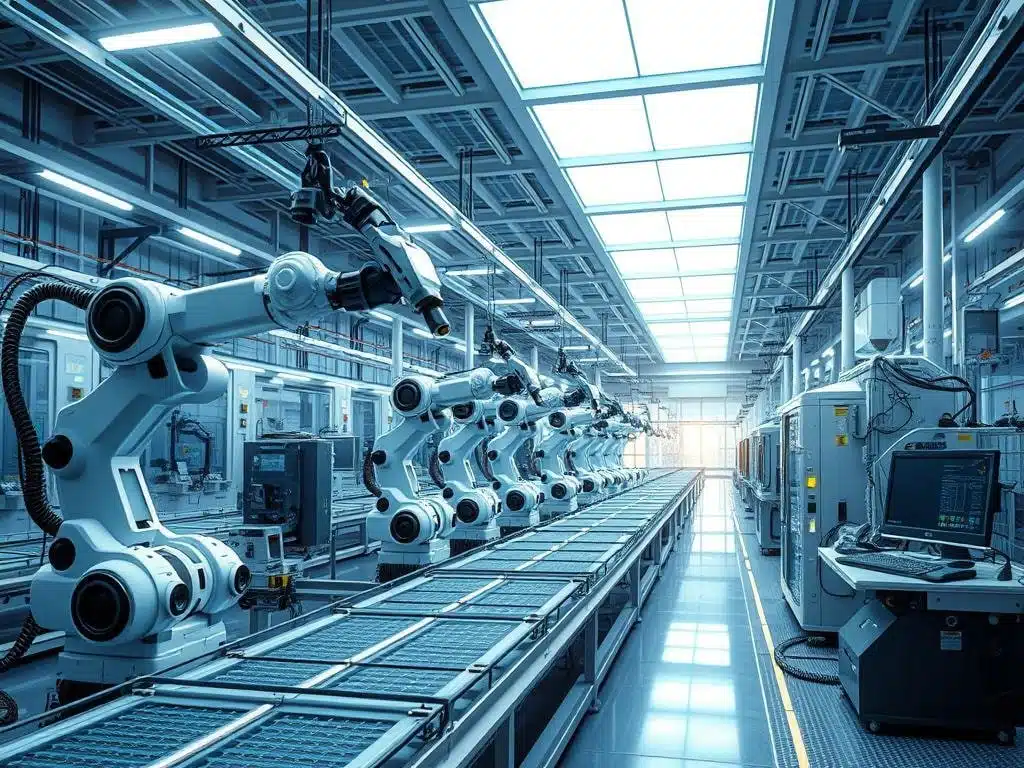
Looking forward, advanced automation continues to merge with emerging tech, transforming industrial operations. The merging of IoT, AI, and real-time data management not only optimizes operations but also drives industries towards peak efficiency and customization. These advancements allow industries to align their processes with future market trends and sustainability objectives, maintaining a competitive stance in an ever-changing market.
Conclusion
Reflecting on the progress in embracing modern industrial automation, the importance of Distributed Control Systems (DCS) is clear. These systems greatly enhance productivity across various industries, from chemicals to power generation. Strategic DCS implementation boosts safety, improves efficiency, and ensures product consistency. This aligns with our dedication to sustainable practices, utilizing DCS for real-time control and predictive maintenance.
DCS systems are crucial in energy, oil & gas, and water treatment areas. They safeguard critical infrastructure and manage complex process interactions. Beyond operational benefits, they demonstrate an organization’s commitment to technological advancement and long-term success. The impact of DCS on productivity includes minimized downtime and optimized resource use. This places businesses at the forefront of a competitive, evolving industrial environment.
The future holds seamless IIoT integration, advanced cybersecurity, and AI utilization. These advancements indicate a dynamic landscape of innovation and adaptability. DCS is not just an upgrade; it’s a core element for a smarter and sustainable industrial future. Adopting robust control systems ensures our practices are forefront, leading the way in manufacturing and production achievements.
FAQ
How do DCS enhance productivity and optimize industrial processes?
DCS automate tasks and provide necessary real-time data. This allows for swift adjustments and consistent operations. Their distributed control structure significantly boosts productivity. They also support smart technologies, enhancing optimization across various operations.
What operational improvements do DCS bring to industrial environments?
DCS streamline operations by automating tasks and reducing errors. They process real-time information for timely adjustments and minimize downtime. This leads to higher product quality and strengthens market competitiveness through advanced automation.
In what ways can DCS revolutionize industrial safety?
DCS ensure safety by monitoring conditions and controlling operations in real-time. They implement emergency protocols to avoid accidents. Moreover, they help operations adhere to international safety standards, safeguarding personnel and equipment alike.
How do DCS systems differ from traditional centralized control systems?
Unlike centralized systems, DCS are modular and dispersed, ensuring operational continuity even when a component fails. This resilience supports real-time optimization essential for maintaining quality and delivers competitive advantages in automation technology.
What role does DCS play in the integration of IoT & AI in manufacturing?
DCS play a crucial role in embedding IoT and AI into manufacturing. They enable the use of predictive maintenance, intelligent analytics, and autonomous systems. Through these technologies, DCS streamline operations and boost efficiency dramatically.
Can DCS lead to cost savings in industrial operations?
Definitely, DCS lower operational costs by reducing energy use, material wastage, and labor expenses. They enhance equipment efficiency and process automation, allowing for more economical operations while maintaining high standards.
How does Industrial IoT (IIoT) benefit from the integration with DCS?
IIoT gains significantly from DCS integration, enhancing connectivity and data sharing. This fosters a data-centric industrial atmosphere. Together, DCS and IoT devices collect, analyze, and apply data to optimize decision-making and operational efficiency.
What advancements in flexibility do DCS offer to manufacturers?
DCS enhance flexibility for manufacturers by facilitating rapid adjustments to meet market changes. Their scalable designs support customization and adaptability, enabling manufacturers to leverage advanced automation technologies and remain competitive.
Why is it important for companies to embrace modern industrial automation with DCS?
Adopting modern industrial automation through DCS is essential for boosting productivity, ensuring safety, and adhering to sustainability practices. DCS offer strategic advantages in evolving industrial sectors, securing a competitive edge for companies.






